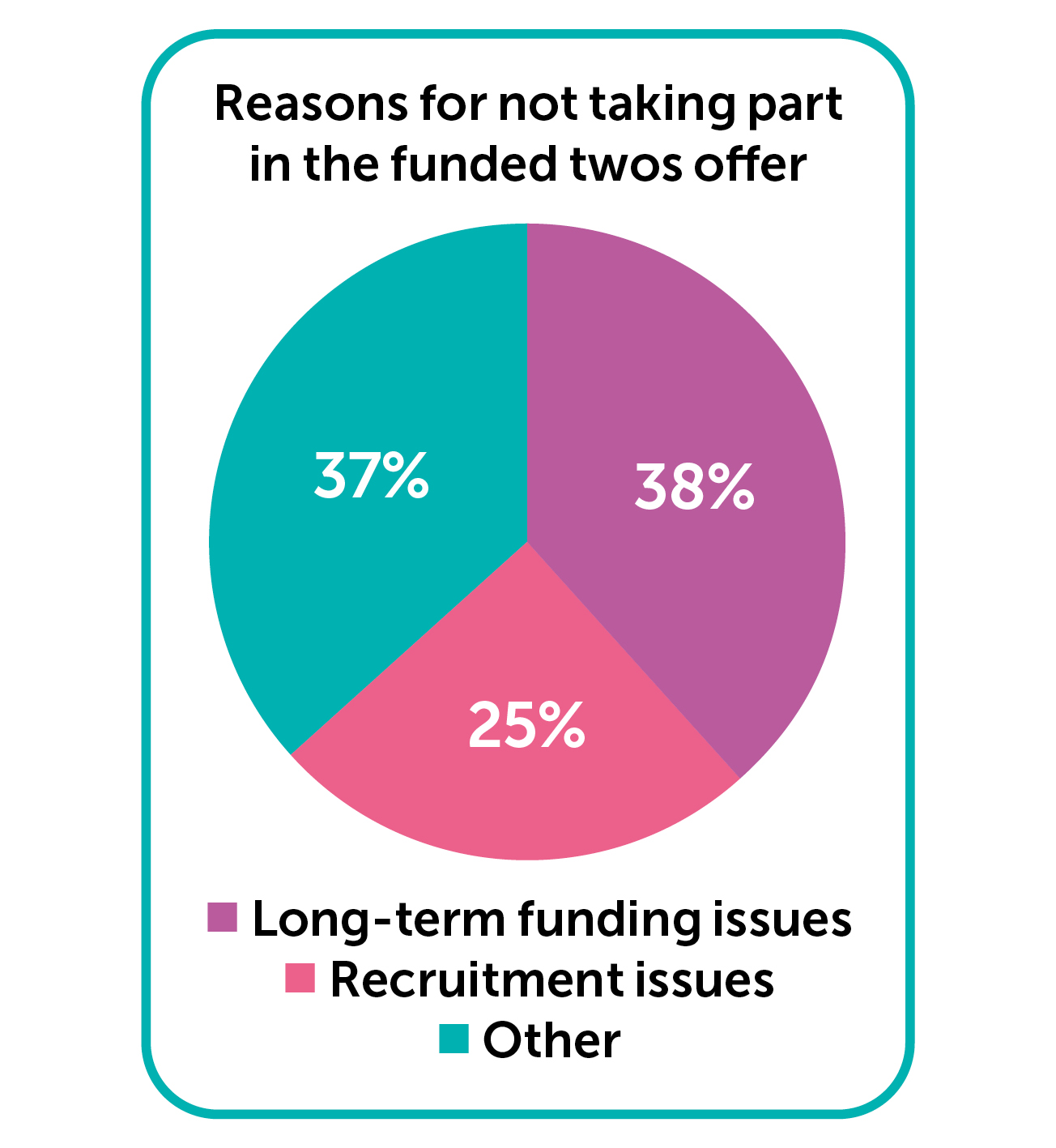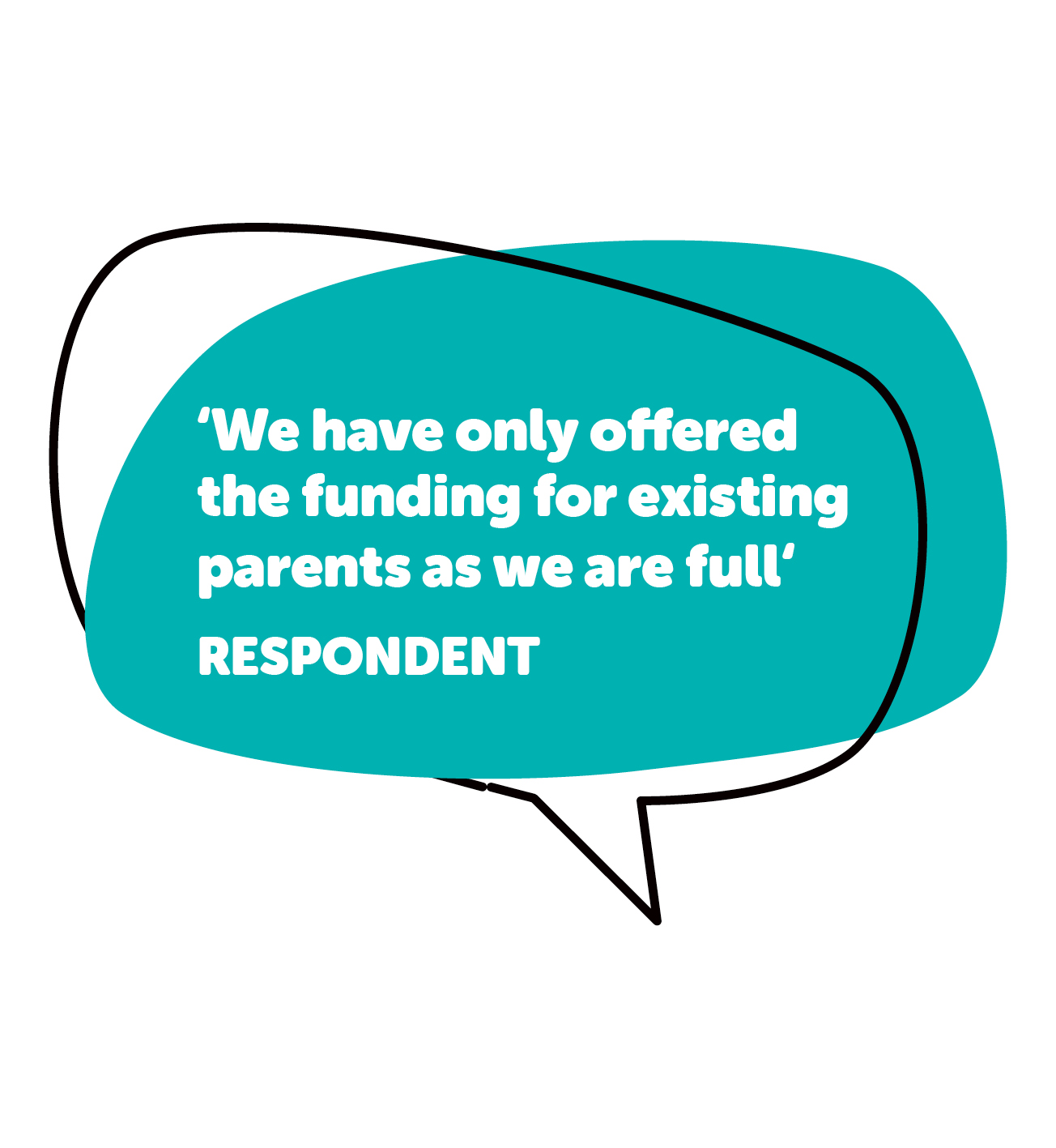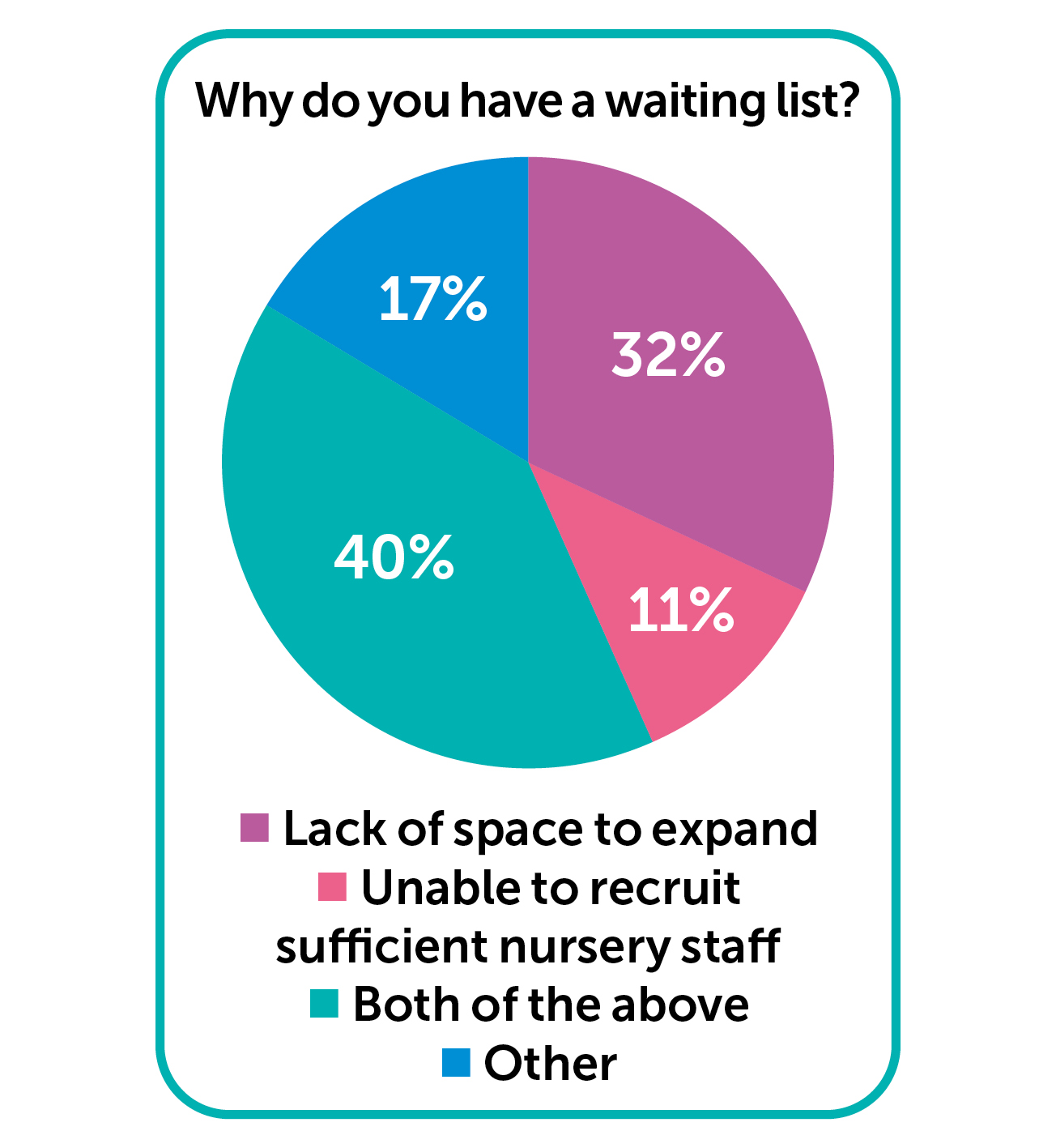
More than 60 per cent of early years settings have a waiting list for the new funded two-year-old places, according to findings from a Nursery World survey.
![]() Our snap survey on the 15-hour funded two-year-old places reveals the majority of those providers taking part in the scheme already have a waiting list for the two-year-old age group, less than a month after working parents became eligible for the offer.
Our snap survey on the 15-hour funded two-year-old places reveals the majority of those providers taking part in the scheme already have a waiting list for the two-year-old age group, less than a month after working parents became eligible for the offer.
Our responses show that this is largely due to a lack of space to expand and an inability to recruit sufficient staff.
This is despite the Government claiming one of the reasons why two-year-olds haven’t taken up a funded place is because parents have changed their mind about formal childcare, or were issued an eligibility code even when they didn’t need one (‘More than 51,600 two-year-olds without a funded place’, NW online, 19 April 2023).
The Department for Education (DfE) has also said that all local authorities have reported they are currently meeting the demand from parents for childcare places.
Back into work
While ministers claim the twos offer is encouraging new parents back into work, there are suggestions from providers that many of the funded twos places are being used by existing parents who are now benefiting from a funded place.
 As Early Years Alliance chief executive Neil Leitch has argued, the figures on the number of two-year-olds with a place do not indicate which parents are taking up the hours.
As Early Years Alliance chief executive Neil Leitch has argued, the figures on the number of two-year-olds with a place do not indicate which parents are taking up the hours.
‘It’s not clear how many are newly created places, rather than existing places where parents have switched from paying privately to accessing government funding,’ he said.
This is backed up by Jo Morris, director of Playsteps Day Nursery in Swindon who told Nursery World that across her two nurseries, just one family in 130 has specifically said they will join in September because of the funding, with the offer seemingly helping existing families reduce their bills rather than attracting new families in.
A total of 367 respondents took part in our survey on the Government’s expanded offer for twos, which ran online from 15-22 April.
It reveals that most of these providers (88 per cent) are offering the expanded childcare offer of 15 hours of funded places for two-year-olds, which became a right for eligible working parents from the start of April. We received responses from 316 providers who said they were taking part in the expanded offer and 45 who said they were not.
 However, the survey highlights issues around capacity to expand the childcare offer, due to lack of space and problems recruiting staff.
However, the survey highlights issues around capacity to expand the childcare offer, due to lack of space and problems recruiting staff.
A damning report from the National Audit Office, published last week, highlights how dates were set for the roll-out without the Government understanding local authorities’ and providers’ capacity to deliver an ‘unprecedented’ level of growth in the workforce and new places.
Of the 12 per cent who told us they are not taking part in the Government scheme, the reasons cited include long-term underfunding and issues with recruitment, ‘the hassle of the paperwork’, lack of space, no access to capital funding, and not currently having children that qualify.
Waiting lists
When asked if they have a waiting list for the new two-year-old places, 62 per cent said ‘yes’ and 38 per cent said ‘no’. A total of 314 answered this question.
The responses showed:
- 82 per cent have less than 20 children on their waiting list.
- 15 per cent have 20-50 children on their waiting list.
- 3 per cent have 50-100 children on their waiting list.
 Reasons for having a waiting list include lack of space to expand (32 per cent) and inability to recruit sufficient staff (11 per cent). A total of 40 per cent cited both reasons for having a waiting list.
Reasons for having a waiting list include lack of space to expand (32 per cent) and inability to recruit sufficient staff (11 per cent). A total of 40 per cent cited both reasons for having a waiting list.
Some respondents also said that they have no interest in expanding. One explained, ‘[Our] setting is simply at capacity and we do not want to increase room size and impact quality of care. We are happy with the size of the setting we have. Expansion is not needed.’
Our research echoes recent findings from the DfE’s Pulse survey which revealed that as a result of staffing challenges, 49 per cent of group-based providers have introduced a waiting list. A total of 1,804 providers took part.
Restrictions on places
We also asked whether providers placed any restrictions on funded twos places.
Of the 240 responses to this question, 28 per cent said they stipulated core hours, 38 per cent said children need to attend for a certain number of hours or days a week, and 34 per cent said they put other restrictions in place.
Specific examples given by providers include:
- A child attending for a set minimum number of hours a day, e.g. six or eight.
- ‘Part-time sessions have to include a Monday or Friday.’
- ‘Child needs to attend a minimum of six hours a day.’
- ‘We have no restrictions, parents can choose the hours they want.’
A total of 27 per cent said they cap the number of places they offer, while 47 per cent have additional charges to help them stay sustainable.
![]() Fifty-six per cent said they had increased fees from April, compared with 44 per cent who have not. A total of 289 people responded to the question. Of those that have put up their fees, 60 per cent have increased them by 5-10 per cent and 35 per cent by 3-5 per cent.
Fifty-six per cent said they had increased fees from April, compared with 44 per cent who have not. A total of 289 people responded to the question. Of those that have put up their fees, 60 per cent have increased them by 5-10 per cent and 35 per cent by 3-5 per cent.
Extra charges
We also asked for examples of extra charges that providers have added to parents’ bills to help them stay sustainable.
Some providers indicated that they have only recently started to charge for extras following the funded hours expansion.
One said, ‘We now charge for snacks and nappies, unlike before’, adding that they do not provide lunches.
Another said, ‘£1 per funded hour “additional services” fee for all children. This will go some way towards bridging the funding drop as children turn three. When we take funded [children] at nine months from September, we will invoice the same £1 per funded hour to go towards the anticipated drop at two and further drop at three and four over the years.’
One respondent said they would charge a fee of £30 for any child that attends core hours of 16-30 hours or more, and a £15 charge for those attending core hours of 15 hours or under, with these charges at every half-term.
Another said their ‘additional service charge’ was £10 per half day (5 hours). ‘This covers full catering service, consumables, and extra/specialist activities such as regular sports/drama and family events.’
Parents’ views
When asked if they have received any negative comments or pushback from parents:
- 162 (83 per cent of the question respondents) said they had because parents do not understand hours are not ‘free’, but are funded, and settings can charge for extras or limit the ‘free’ hours.
- 46 said they had due to increased fees/charges.
- 84 had because they cannot provide the hours needed.
CASE STUDY: Under 1 Roof (U1R) Nursery – Thanet

‘I was getting about six phone calls a day just before the Easter holidays,’ says Sophie Spurrier, nursery director and head of nursery, who has been inundated with enquiries about the two-year-old offer, and has just taken on a receptionist to help with the paperwork.
A former Reception teacher who also runs a dance school, she opened her nursery in a converted warehouse in March 2023, and is now at full capacity, with 175 children on roll, including 40 families who use the two-year-old room.
Around 30 of them are taking the funded places, with the rest using the child grant payment service for students. ‘I have two new families taking the funded offer, but that’s because families pre-empted it and I had a lot of new families signing up between September and January. The demand is there massively. I have no space now until at least April 2025,’ Sophie says.
She believes a lot of parents ‘took the hit financially’ for a couple of months knowing they would have the funding from April. ‘The majority are on 9-3 and most are stretched.’
The nursery charged £3.50 for lunch at cost for funded children, but because staff wages, food and other costs have gone up, since April it has had a £5.50 daily consumables charge, including baking activities.
‘The funding is low in Kent. We live in quite a deprived area, so I’m trying to balance supporting families and survive as a business. I’m on the fence as to whether I put fees up,’ she adds.
MORE INFORMATION
- Our new series starting in June, ‘Making ends meet’, will look at how providers are making the expanded offer sustainable.









